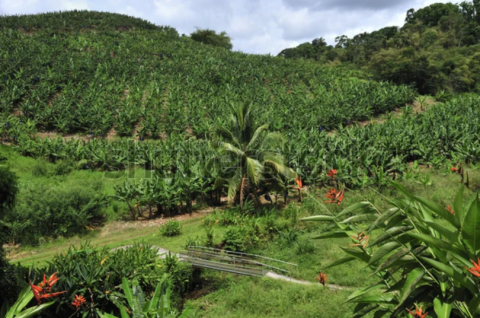At least NPR would discriminate against those outside their tribe in the hiring stage, The Conversation looked worse by being hypocrites pretending that science and health were their touchstones, and not science topics their political demographic endorses.
If they care about science, a weird claim about a weedkiller wouldn't have been published without the kind of critical skepticism they would use if scientists claimed glyphosate improves nature. Yet ecologists don't get the scrutiny scientists do, because being opposed to science is part of the doctrine of the activist world.

Martinique banana plantation. T photography/Shutterstock
They did the kind of thing Generals in war have done for thousands of years and environmental lawyers adopted more recently - they prepared the battlefield well in advance. In this case a hand-selected plot in Martinique that led them to conclusively shout that a weedkiller reduced poorly-defined "biodiversity" by 21 percent. That's a lot fewer species.
Is there a plausible biological, toxicological, or chemical mechanism that would explain it? No, but ecologists don't need science, they have a narrative. And that is what they go with and never stop. It is like those bad epidemiologists at IARC or NIEHS who insist the HARKing they did in spreadsheet data found some killing is killing us and it is up to stupid scientists to show how their work must be true.
Farmers who actually farm wonder the same thing about this paper. They aren't experiencing it, no one in agriculture is, just these two. Then without showing how any of their work is happening in the real world they go full Gilles-Eric Seralini and talk down to everyone reading and explain why soil is important. Like Bono telling us clean water matters, it probably sells to the poorly educated, but is just annoying to everyone literate.
The 'alternatives' they propose are just as cloying as the premise. Sure, use sheep to eat weeds, so bananas will go from $0.40 each to $5.40 each. Even the Biden administration and its 44% increase in food costs in three years would think that is excessive yet ecologists don't have to think about people, only plants in a closed-system fantasy they write.
Yet like all other fiction, just because someone can write it doesn't mean The Conversation should publish it.



Comments